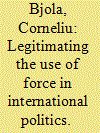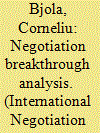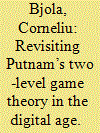|
|
|
Sort Order |
|
|
|
Items / Page
|
|
|
|
|
|
|
| Srl | Item |
| 1 |
ID:
179088


|
|
|
|
|
| Summary/Abstract |
Drawing on the case of Finland and its model of ‘resilience’ to digital disinformation, the article provides an original framework for understanding the logic of digital propaganda and the conditions that may facilitate an effective response. Building on recent research connecting digital propaganda to the disruption of the public spheres in democratic societies, the study argues that the logic of digital propaganda could be unpacked by examining the mechanisms that facilitate the diffusion of disinformation from the microsphere of the daily individual experience to the macrosphere of political decision-making. It is thus argued that the connection between the two spheres is enabled by the formation and political mobilization of ‘unruly’ counterpublics, that is, of arenas of textual and visual contestation of politically marginalized groups promoting issues aligned with the disinformation agenda. Using this framework, the study shows that Finland’s resilience progress has mostly occurred on the macrosphere level, where effective institutions have been applying transparent and proactive policies grounded in collaboration and research. However, these efforts are at risk of being weakened by the rise of influential counterpublics unless Finland takes further measures to protect its public sphere by reducing divisions in the microsphere.
|
|
|
|
|
|
|
|
|
|
|
|
|
|
|
|
| 2 |
ID:
088345


|
|
|
|
|
| Publication |
2009.
|
| Summary/Abstract |
By remaining epistemologically committed to an outdated distinction between facts and values, traditional definitions of legitimacy either divest the concept of an important critical component or fail to properly anchor it in the social reality. As an alternative, the article proposes a constitutive theory of legitimacy that reconciles the epistemological tension via the concepts of fairness and tractability and bridges the theoretical gap via the concept of deliberative legitimacy. By applying it to the issue of the use of force, the article argues that a normatively sound and politically relevant model of legitimacy must take into account both to the manner in which actors' commitment to social norms is crafted and the type of conditions that facilitate or constrain the definition, contestation, and adjudication of what counts as legitimacy in a particular political context.
|
|
|
|
|
|
|
|
|
|
|
|
|
|
|
|
| 3 |
ID:
064499


|
|
|
| 4 |
ID:
129050


|
|
|
|
|
| Publication |
2014.
|
| Summary/Abstract |
The article addresses an important gap in the literature on climate negotiations, namely, the question of breakthroughs: what exactly counts as breakthroughs in climate negotiations, how do you measure them empirically, and what practical implications do they have for the negotiation process? To address these questions, the article draws on market trading theory and develops a framework of negotiation breakthrough analysis for defining, recognizing and measuring negotiation breakthroughs. The article argues that breakthroughs in climate negotiations occur when the outcomes breach the resistance or support level of parties' expectations regarding the results of climate talks. It concludes with a discussion of the broader contributions that technical analysis can make to the theory and practice of international negotiations.
|
|
|
|
|
|
|
|
|
|
|
|
|
|
|
|
| 5 |
ID:
160079


|
|
|
|
|
| Summary/Abstract |
Few studies to date have investigated the impact of digitalization on Putnam’s two-level game theory. Such an investigation is warranted given that state and non-state actors can employ digital tools to influence decision-making processes at both national and international levels. This study advances a new theoretical concept, Domestic Digital Diplomacy, which refers to the use of social media by a government to build domestic support for its foreign policy. This model is introduced through the case study of the @TheIranDeal twitter channel, a social media account launched by the Obama White House to rally domestic support for the ratification of the Iran Nuclear Agreement. The study demonstrates that digitalization has complicated the two-level game by democratizing access to foreign policy decisions and increasing interactions between the national and international levels of diplomacy.
|
|
|
|
|
|
|
|
|
|
|
|
|
|
|
|
| 6 |
ID:
079044


|
|
|
|
|
| Publication |
2007.
|
| Summary/Abstract |
Borrowing from Norbert Elias, we introduce the habitus of restraint to the study of security communities. This habitus constitutes a key dimension of the glue that holds security communities together. The perceived compatibility of practices emanating from the habitus that members hold fosters the collective identity upon which a security community is built. The violation of a member's habitus by the practices of another member, however, disrupts the reproduction of collective identity and triggers a crisis of the security community. Our analysis of Germany's reaction to Washington's case for war against Iraq provides empirical evidence for the salience of the habitus for the internal dynamics of security communities
|
|
|
|
|
|
|
|
|
|
|
|
|
|
|
|
| 7 |
ID:
179087


|
|
|
|
|
| Summary/Abstract |
Social media are inherently visual platforms. Every day, billions of photographs, videos, cartoons, memes, gifs, and infographics are uploaded and shared for the world to see online. As a result, political actors such as diplomats, militaries, international organisations, terrorist groups, corporations, celebrities, diasporas and members of the general public are now visual narrators of global politics. They tell stories about themselves, each other, and the rest of the world through the images they share on social media. Consequently, it is imperative that scholars of International Relations analyse visual narratives of global politics in the digital age. This article introduces the special issue on this topic by drawing together and advancing research on narratives, visual global politics, and digital media. In doing so we outline the conceptual underpinnings of, and rationale for, the special issue before introducing the contributions of each of the articles collected herein.
|
|
|
|
|
|
|
|
|
|
|
|
|
|
|
|
|
|
|
|
|